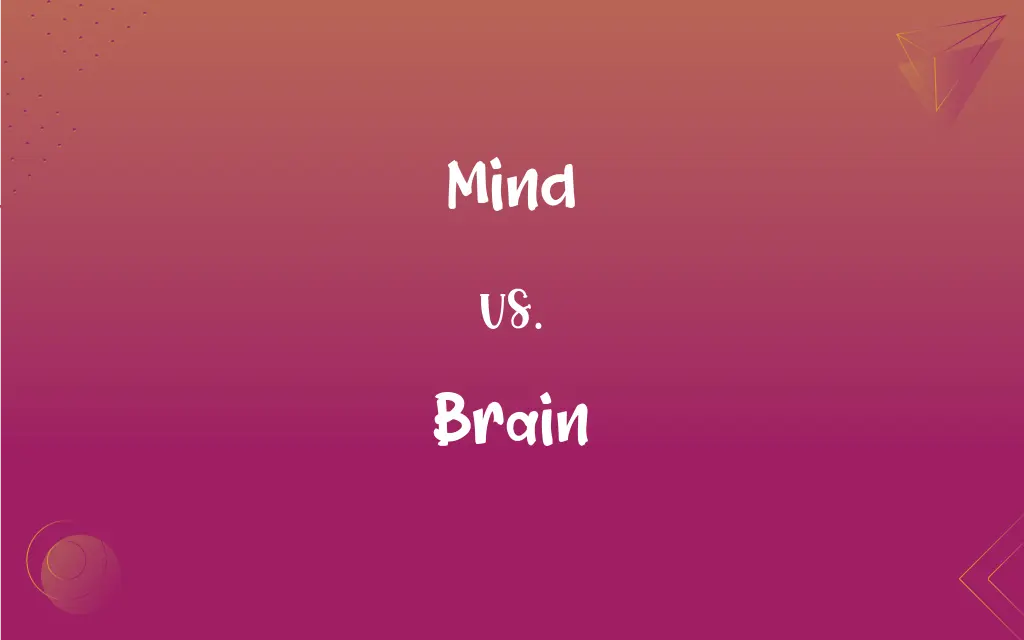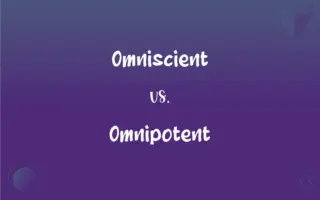Mind vs. Brain: What's the Difference?
Edited by Aimie Carlson || By Janet White || Published on December 20, 2023
The mind refers to the abstract, intangible aspects of thought and consciousness, while the brain is the physical, tangible organ within the skull.

Key Differences
The mind represents the cognitive aspects of consciousness, encompassing thoughts, emotions, and imagination. The brain, in contrast, is the physical structure responsible for neural processes that underpin these mental functions.
The mind is often associated with mental faculties like perception and memory, while the brain is the biological hardware that enables these faculties through its complex networks of neurons and synapses.
The mind is typically considered in psychological and philosophical contexts, reflecting subjective experiences and personal identity. Conversely, the brain is studied in biological and neurological contexts, focusing on anatomy and physiology.
The concept of the mind encompasses abstract entities like beliefs and desires, which cannot be physically located. The brain, however, can be examined, measured, and observed through scientific methods.
In discussions about mental health and cognition, the mind is central, emphasizing psychological and experiential aspects. The brain is more relevant in medical and scientific discussions, where physical aspects of brain function and health are key.
ADVERTISEMENT
Comparison Chart
Nature
Abstract, intangible
Physical, tangible
Study
Psychology, Philosophy
Neurology, Biology
Functions
Consciousness, emotions, thinking
Neural processes, brain activity
Representation
Metaphysical concepts, subjective
Physical structures, observable
Health and Dysfunction
Mental health, cognitive disorders
Neurological disorders, brain injuries
ADVERTISEMENT
Mind and Brain Definitions
Mind
The repository of one's feelings and emotions.
Her mind is at ease after the meditation session.
Brain
The source of mental capabilities and understanding.
His brain absorbs information like a sponge.
Mind
The center of consciousness and thought.
She changed her mind about the trip after hearing the weather forecast.
Brain
A term denoting intellectual power.
She is the brain behind the successful marketing campaign.
Mind
The faculty of memory and imagination.
His mind is filled with creative ideas for his novel.
Brain
The organ in the skull responsible for thought and nerve processing.
The brain controls both voluntary and involuntary actions.
Mind
The ability to make decisions and judgments.
She has a sharp mind for business strategies.
Brain
A metaphor for intellectual capacity.
Solving that puzzle requires a lot of brain power.
Mind
The focus of intellectual activity.
His mind wanders during lectures.
Brain
The center of intelligence and reasoning.
She's known for her brilliant brain in scientific research.
Mind
The faculty of a human or other animal by which it thinks, perceives, feels, remembers, or desires
Studying the relation between the brain and the mind.
Brain
The portion of the vertebrate central nervous system that is enclosed within the cranium, continuous with the spinal cord, and composed of gray matter and white matter. It is the primary center for the regulation and control of bodily activities, receiving and interpreting sensory impulses, and transmitting information to the muscles and body organs. It is also the seat of consciousness, thought, memory, and emotion.
Mind
A person of great mental ability
The great minds of the century.
FAQs
What is the mind?
The mind refers to consciousness, thought processes, and mental states.
Can the mind exist without the brain?
No, the mind's functions are dependent on the brain's physical presence and health.
What is the brain?
The brain is the physical organ within the skull, responsible for neural activities.
Is the brain part of the mind?
The brain is the physical foundation upon which the mind operates.
How do we study the brain?
The brain is studied through neuroscience, biology, and medicine.
How do we study the mind?
The mind is studied through psychology, philosophy, and cognitive science.
Can the brain function without the mind?
The brain can operate basic biological functions, but higher-order thinking requires the mind.
How do the mind and brain interact?
The brain's physical processes facilitate the mind's cognitive functions.
Do animals have minds like humans?
Animals have minds, but human minds are unique in complexity and language use.
Is the brain the only organ involved in mental processes?
While central, the brain works with other systems, like the nervous system, in mental processes.
Are mind and consciousness the same?
Consciousness is a facet of the mind, encompassing awareness and perception.
Can brain damage affect the mind?
Yes, brain damage can significantly alter cognitive functions and mental states.
Is the mind solely a product of the brain?
Many theories suggest the mind emerges from brain processes, but this is a complex and debated topic.
Are mental illnesses brain disorders?
Many mental illnesses have correlates in brain function, but they also involve complex psychological factors.
Are thoughts part of the mind or brain?
Thoughts are part of the mind, arising from brain activity.
Does the mind change as the brain ages?
Yes, changes in the brain due to aging can affect mental functions.
Can technology enhance the brain or mind?
Technology can assist brain functions, potentially influencing mental capacities.
Can mental health treatments target both the brain and mind?
Effective treatments often address both biological (brain) and psychological (mind) aspects.
How do emotions relate to the brain and mind?
Emotions are experienced as mental states (mind) and are linked to brain activity and chemistry.
How does learning affect the brain and mind?
Learning can physically alter the brain's structure and enhance the mind's capabilities.
About Author
Written by
Janet WhiteJanet White has been an esteemed writer and blogger for Difference Wiki. Holding a Master's degree in Science and Medical Journalism from the prestigious Boston University, she has consistently demonstrated her expertise and passion for her field. When she's not immersed in her work, Janet relishes her time exercising, delving into a good book, and cherishing moments with friends and family.
Edited by
Aimie CarlsonAimie Carlson, holding a master's degree in English literature, is a fervent English language enthusiast. She lends her writing talents to Difference Wiki, a prominent website that specializes in comparisons, offering readers insightful analyses that both captivate and inform.






































































